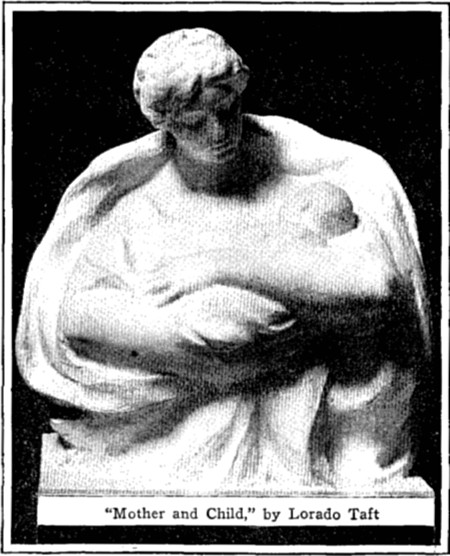 "Mother and Child," by Lorado Taft
"Mother and Child," by Lorado TaftThe Eugenic Marriage
A Personal Guide to the New Science of Better Living and Better Babies
By W. GRANT HAGUE, M. D.
College of Physicians and Surgeons (Columbia University), New York;Member of County Medical Society, and of the American MedicalAssociation
In Four Volumes
VOLUME III
New York
THE REVIEW OF REVIEWS COMPANY
1916
Copyright, 1913, by
W. Grant Hague
Copyright, 1914, by
W. Grant Hague
TABLE OF CONTENTS
CHAPTER XXIV
THE FORMATIVE PERIOD
The best age at which to marry—Incompatibility of temperament—A happymarriage need not be a successful one—The evils of early marriage—Thewedding night, its medical aspect—The honeymoon—When marital relationsare painful—Times when marital relations should be suspended—The firstweeks and months of wifehood—The formative period—A true marriage—Awife's true position in the household—Only 5% of happymarriages—Period of adaptation—Differences of opinion—Differences ofprinciple—The attainment of success—Arguing trifles—You must knowwhat you want—The right kind of wife—Contributing to her husband'sefficiency—What are the requisites of efficiency—Goodhealth—Thoroughly cooked meals—Rest at night—Having a system—Enoughexercise—Freedom from worry—Do your part—The first quarrel—Faultfinding—The husband's efficiency depends upon the wife—Work must beinteresting—The wife's part ... PAGE 331
Advice to Young Wives
CHAPTER XXV
HOW TO ACHIEVE
What the young wife owes to herself—Why was I born—What are thepersonal qualities necessary to success—What are the personal qualitiesnecessary to happiness—Self-control—What is a thought—The evil habitof hasty judgment—The bad thought habit—Training the mind—"Go aboutit in the right way"—Be sure your husband's friends are yourfriends—Be a good fellow—Two kinds of people in the world—Everythingdepends upon what we do with our mind—The most popular woman—The giftof flattery—Choosing your friends—True friendship expects and demandsnothing—True friendship is necessary—"By your friends shall ye beknown"—Making resolves—The formula of success—When fortune knocks.... PAGE 357
CHAPTER XXVI
SPARE MOMENTS
The study habit—The germ of self-culture—Millions of tiny cells in ourbrain—The economic value of the study habit—Two[Pg iv] ways of gainingknowledge—Happiness in the company of those striving for higherideals—A young wife's incentive to self-culture—The difference betweenmoral and mental disloyalty—The study habit creates its owninterest—Nosophobia, or the dread of disease—"Keep still and be well"... PAGE 375